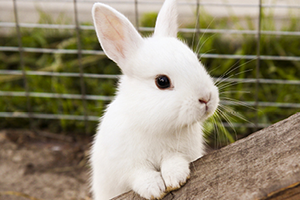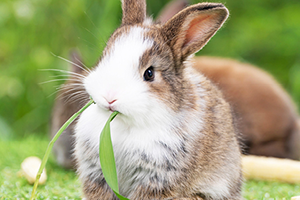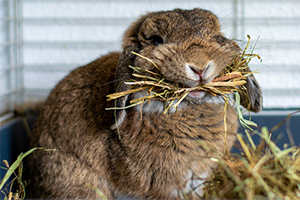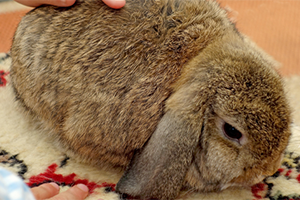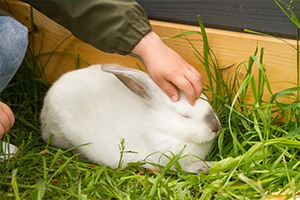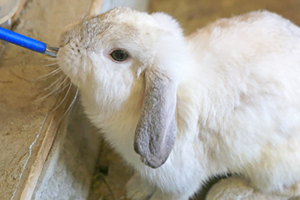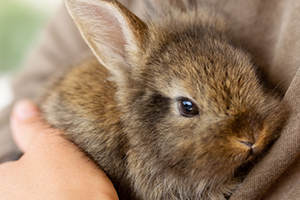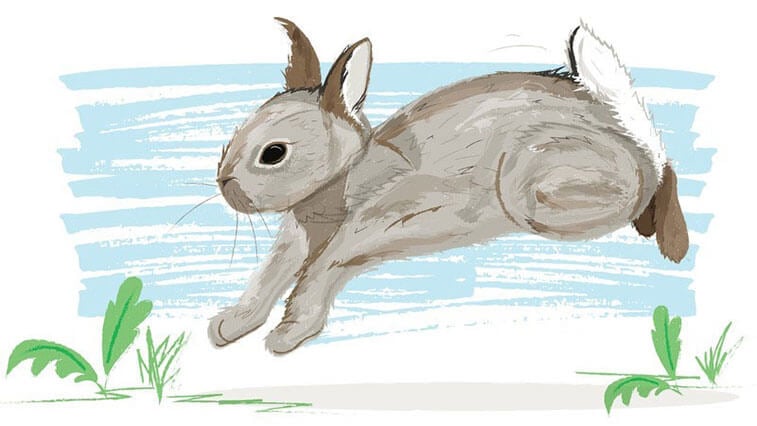Rabbit body language: How do I know if my rabbit is happy?

Quick Links
Decoding rabbit body language
Pay attention to your rabbits' ears
Your rabbits’ ears can give plenty of clues to their general mood. Here’s what to look out for:
- Both ears up with the insides facing forward: happy and sociable
- Both ears back, combined with a stiff body posture: anxiety or concern
- Both ears up with the insides facing backward: leave me alone
How can you tell if a rabbit is happy?
Nose twitching
Jumping in the air (the 'binky')
It can be a bit disconcerting the first time you see your rabbit doing a ‘binky’, but this expressive movement is theultimate sign of happiness. A binky is slightly different from hopping, the usual way rabbits move around. A binky is a high jump, usually combined with twisting in the air, ear flicking and head flipping. Often, this move is accompanied by high-speed running.
Some rabbits binky a lot, while others might not binky much at all. Others may do a mini version of a binky, by lifting their head and front legs but leaving their back legs on the ground.
Chin rubbing

Chewing
Whether it’s a stick, the side of their enclosure or your skirting boards, rabbits love to chew! This isn’t them being destructive, but simply a way to keep their teeth from overgrowing.
Chewing is a natural activity for rabbits, so be sure to offer your bunnies plenty of things to chew on. Just keep them away from wires!
The bunny flop
Lying down
Circling

Butt twitching

What makes rabbits happy?
Happy rabbits are full of energy and love to play, so creating a space where they can move freely is key to keeping them feeling good. The RSPCA and RWAF suggest a hutch size of at least 6ft x 2ft and 2ft high for two medium-sized rabbits – but the more space, the better.
Since rabbits are prey animals, they need to feel secure in their space. Adding tunnels and boxes gives them cosy spots to retreat to when they’re feeling anxious. It’s also helpful to keep their environment fun and stimulating by providing a variety of toys, tunnels and chews to prevent boredom.
Fresh hay should make up the bulk of their meals, supported by leafy greens and high-quality rabbit pellets. And don’t forget unlimited access to fresh water to keep them well hydrated. Rabbits are also naturally social creatures that live in groups in the wild, so adopting bunnies in pairs can make a huge difference to their wellbeing.
Finally, unhappiness can stem from underlying health problems, so it’s important to get your bunnies checked out with your local vet if their behaviour changes.
How can I tell if my rabbits are unhappy?
Anxiety, illness or a change in the dynamics of a bonded pair of rabbits can all cause rabbits to feel unhappy. Because rabbits respond to stress and threats in different ways, it’s important to know what’s normal for your rabbits and to keep an eye on whether that changes.
Remember that rabbits are very good at hiding any issues, so any changes may be subtle to start with. Watch out for the following signs of unhappy rabbit body language and behaviour, and if you’re concerned, it’s always best to speak to your vet.
Boxing

Thumping

Kicking
Crouching
Hiding
When rabbits feel anxious, they’ll often hide. In this case, don’t lift your bunnies out of their safe spot, as this can make them feel threatened and even more anxious. Instead, give them space to come out in their own time. Make sure they have plenty of fresh food and stimulating toys in their hutch to help entice them to come out and explore.
If your rabbits are hiding away for long periods, ask your vet to check them over for signs of illness or pain.
Changes in eating habits
Constant grooming
What sound does a rabbit make?
Rabbits aren’t very vocal, but the sounds they do make can indicate their mood.
When rabbits feel threatened, angry or want to show disapproval, they may give a little grunt. If they’re experiencing discomfort or pain, they may grind their teeth – although this can also be a sign of contentment.
If your rabbit screams, they’re in severe pain or fear, and need immediate attention.
Do rabbits smell?
The impact of fertility and hormones on rabbit body language
Rabbit behaviour can be impacted by hormones. If your unneutered male rabbit suddenly becomes aggressive, he may be trying to protect his territory. If an unspayed female rabbit is eating more than usual, seems reluctant to be handled or is creating a nest – she’s probably pregnant!
Aggressive behaviour is more common in rabbits that haven’t been neutered, and 80% of unneutered female rabbits have reproductive complications at some point. It’s always best to neuter your rabbits so they can live happily together.
Petplan is a trading name of Pet Plan Limited (Registered in England No. 1282939) and Allianz Insurance plc (Registered in England No. 84638), Registered office: 57 Ladymead, Guildford, Surrey GU1 1DB.
Pet Plan Limited is authorised and regulated by the Financial Conduct Authority. Financial Services Register No. 311969. Allianz Insurance plc is authorised by the Prudential Regulation Authority and regulated by the Financial Conduct Authority and the Prudential Regulation Authority. Financial Services Register No. 121849. Pet Plan Limited is a subsidiary of Allianz Insurance plc.



